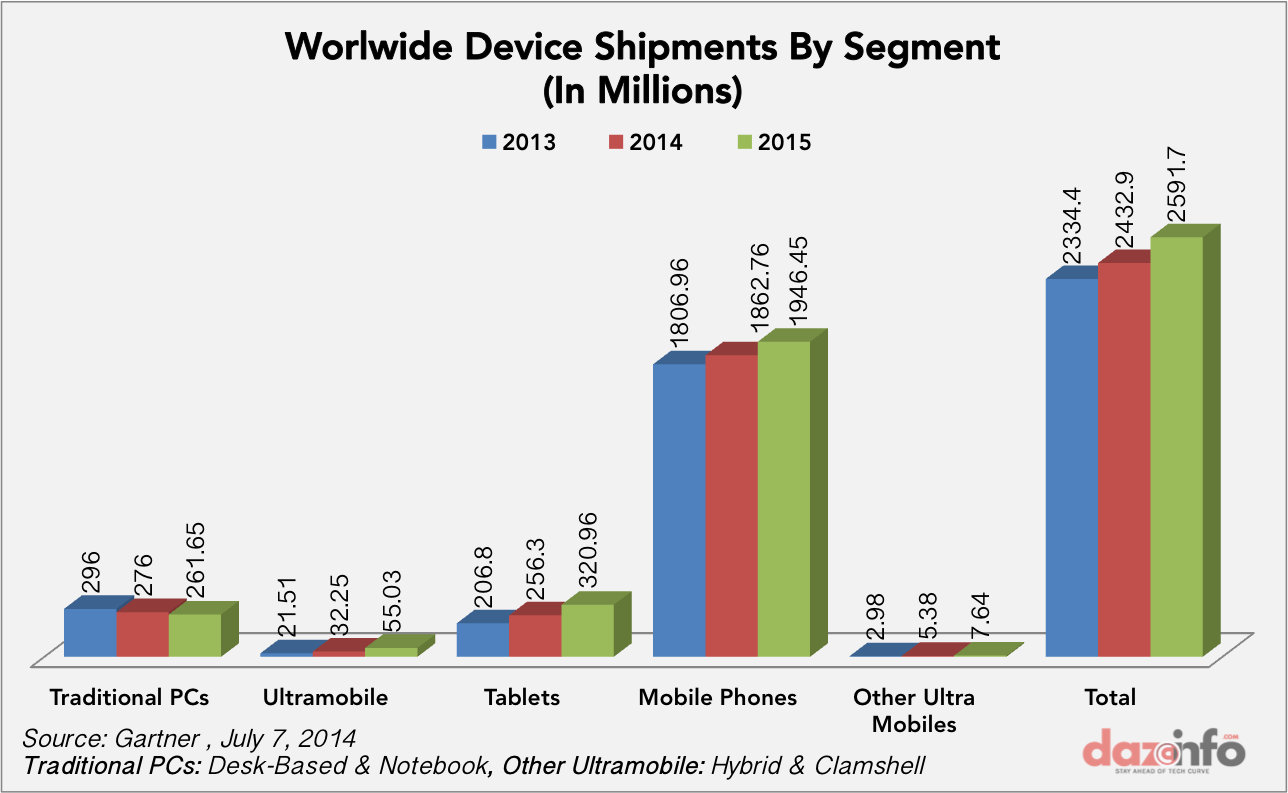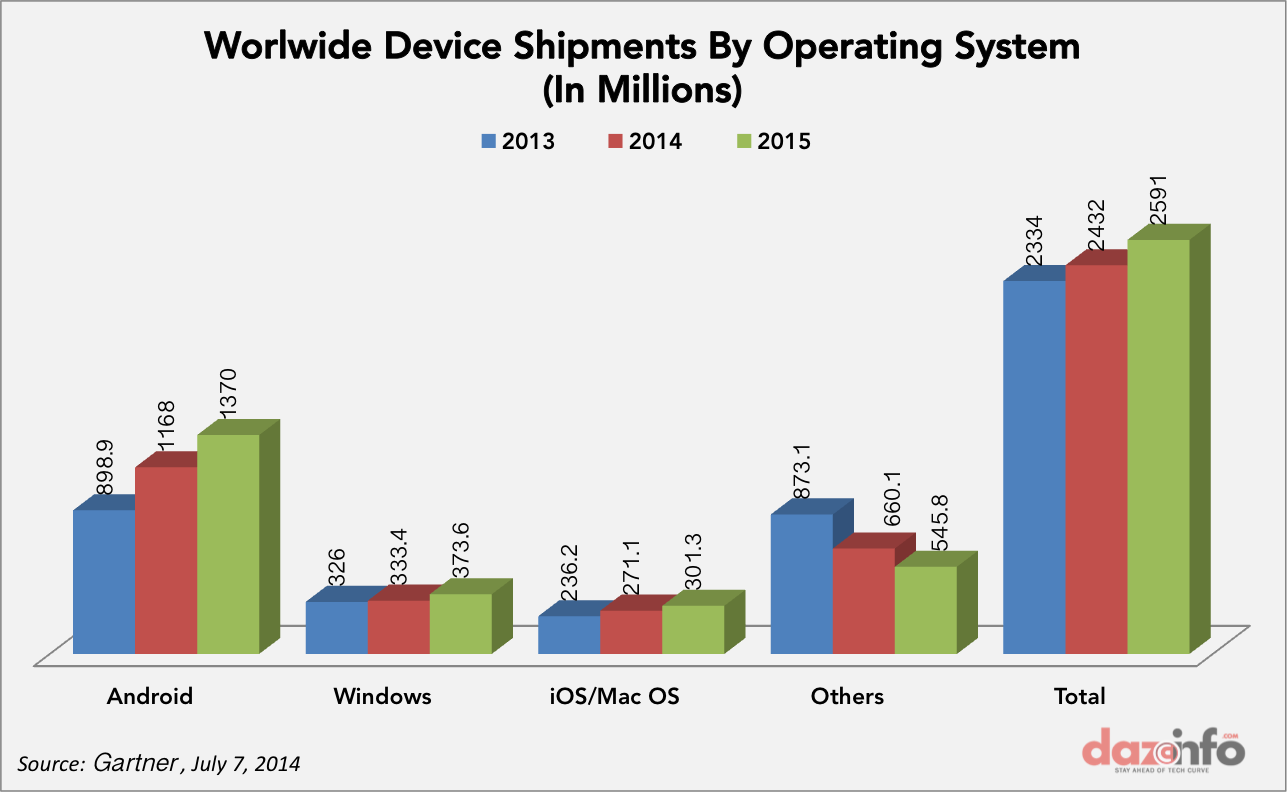The devices’ market has witnessed an unprecedented growth for last few years and Google Inc. (NASDAQ:GOOG) Android has emerged as the main driver leading the market towards a new milestone. The traditional PC market is declining though, smartphone and tablets have compensated well to the loss. In 2014 and 2015 Android will grow by about 30% and 15%, respectively – greater than another other OS, claims the recent Gartner report titled “Worldwide Device Market Growth 2014 – 2015“.
Microsoft Corporation (NASDAQ:MSFT) officially terminated support for its popular Windows XP desktop OS on April 2014, and the after-effects have slowed down the drastic decline of the PC market, according to the report. After two years of sluggish PC sales, the firm estimates that the global PC market will shrink by just 2.9% this year, compared to the massive decline of 9.5% during 2013. This figure includes desk-based, notebook, and premium ultramobile devices. Sales of traditional PCs, however, are set to decline by 6.7% this year, compared to 5.3% in 2013.
Gartner research director Ranjit Atwal attributed the softening to the global business market.
“Business upgrades from Windows XP and the general business replacement cycle will lessen the downward trend, especially in Western Europe. This year, we anticipate nearly 60 million professional PC replacements in mature markets.”
Tablet Adoption Rate Being Driven By Low-Price Points
The current findings are a revision of an earlier forecast made during April 2014. Global device shipments are expected to grow by a modest 4.2% this year to reach a total of 2.4 billion shipments in 2014, driven mainly by smartphones and low-priced tablet devices.
Shipments of tablets are expected to see a relative decline in 2014 to reach 256 million units, despite a growth of 23.9% from 2013. The tablet market is mainly being driven by lower price points and large screen tablets, and is partly responsible for Apple Inc. (NASDAQ:AAPL) disappointing iPad sales in Q1 2014. Other factors contributing to this include the lower demand for tablets with large screens and the shift towards phablets in South-East Asia.
Meanwhile, shipments of PC’s are expected to reach 308 million units in 2014, with ultramobiles and premium devices playing a key role. Interestingly, shipments of PC’s are actually expected to buck the declining trend and grow to a total of 316 million units in 2015. It is already an established fact that by 2015, the global tablet shipment will exceed those of traditional PC’s for the first time. Sensing the changing landscape, Microsoft launched the Surface Pro 3 in May 2014, targeting the device as a laptop killer. Similarly, Apple is rumored to be launching a bigger screen iPad Pro device later in 2014, as an alternative to the expensive MacBook.
Windows Phone Market Share to Grow from 4% to in 2014 to 10% by 2018
Sales of mobile phones will reach a massive 2.6 billion units in 2014, increasing by 3% from 2013. Smartphones will represent 88% of these mobile phone sales in 2014, up from 66% in 2013. The main beneficiary of the booing smartphone market will be Google Inc. (NASDAQ:GOOGL) owned Android OS, with shipments officially crossing 1 billion in 2014, as estimated earlier. Android shipments are expected to grow by a massive 30% in 2014, while those of Apple iOS will grow by 15%.
Currently, smartphone growth is primarily being driven by low-price points and large screen devices. Both of these attributes are available to Microsoft, allowing it to compete with Android’s vast array of products. Although the market share of Windows phone is still just 4% globally, the figure is expected to grow to 10% by 2018. Several initiatives have been taken by Microsoft this year to position the Windows Phone OS to take on Apple iOS. Microsoft has gone as far as to waiving the licencing fee for Windows 8.1 mobile OS, as a means of pushing its market share.
The rumored launch of iPhone 6 is sure to receive attention from users who are looking for a larger screen Apple smartphone. The new launch is particularly crucial for the company’s future, as its market share has been on a steady decline over the past few years and now stands at roughly 15%. Unless, Apple can reinvigorate its product cycle with new devices such as the rumored iWatch and other products, its market share is surely headed for a long-term decline.
Interestingly, all other OS are estimated to lose their market in next two years. In 2014, the market share of devices running on other OS will be declined by 25% and the trend will continue in 2015 as well. This is definitely a discouraging scenario for new OS entrants, especially for Samsung and Mozilla, who are planning to set up a big show of Tizen and Firefox OS, respectively, in next few years. Though, its unclear if Samsung will aggressively pursue Tizen aggressively with its Smartphone range but the company has already rolled up smartwatches powered with Tizen OS.
As the global device market matures, several OEM’s are adapting to the changing situation. Manufacturers are now producing cheaper and more advanced smartphones and smartwatches in the hope of cornering the market by themselves. Some of the other interesting filed which are being tapped for future development include home automation, wearables and health monitoring.



